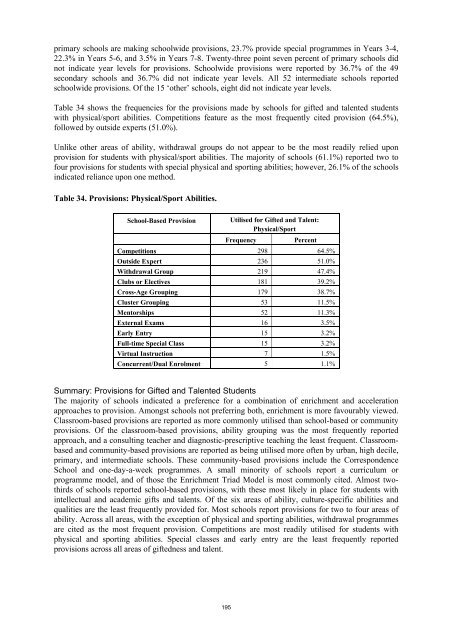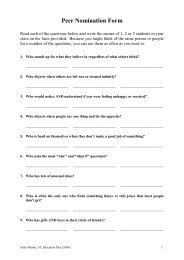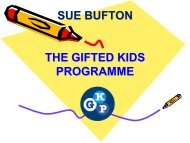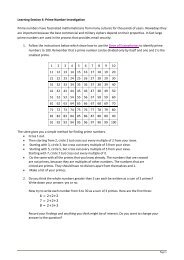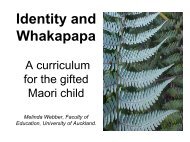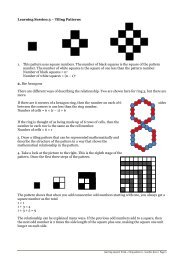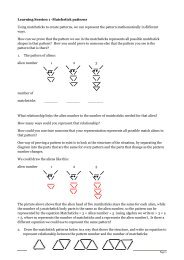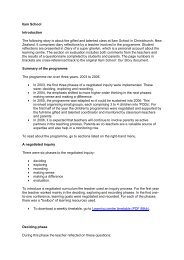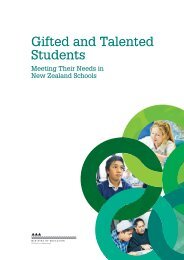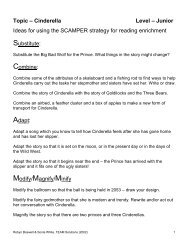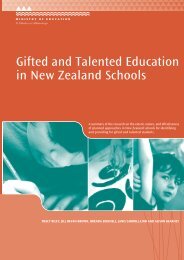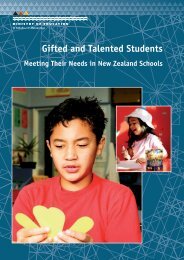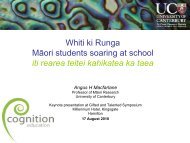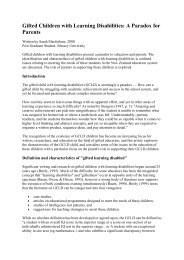The Extent, Nature and Effectiveness of Planned Approaches in ...
The Extent, Nature and Effectiveness of Planned Approaches in ...
The Extent, Nature and Effectiveness of Planned Approaches in ...
You also want an ePaper? Increase the reach of your titles
YUMPU automatically turns print PDFs into web optimized ePapers that Google loves.
primary schools are mak<strong>in</strong>g schoolwide provisions, 23.7% provide special programmes <strong>in</strong> Years 3-4,22.3% <strong>in</strong> Years 5-6, <strong>and</strong> 3.5% <strong>in</strong> Years 7-8. Twenty-three po<strong>in</strong>t seven percent <strong>of</strong> primary schools didnot <strong>in</strong>dicate year levels for provisions. Schoolwide provisions were reported by 36.7% <strong>of</strong> the 49secondary schools <strong>and</strong> 36.7% did not <strong>in</strong>dicate year levels. All 52 <strong>in</strong>termediate schools reportedschoolwide provisions. Of the 15 ‘other’ schools, eight did not <strong>in</strong>dicate year levels.Table 34 shows the frequencies for the provisions made by schools for gifted <strong>and</strong> talented studentswith physical/sport abilities. Competitions feature as the most frequently cited provision (64.5%),followed by outside experts (51.0%).Unlike other areas <strong>of</strong> ability, withdrawal groups do not appear to be the most readily relied uponprovision for students with physical/sport abilities. <strong>The</strong> majority <strong>of</strong> schools (61.1%) reported two t<strong>of</strong>our provisions for students with special physical <strong>and</strong> sport<strong>in</strong>g abilities; however, 26.1% <strong>of</strong> the schools<strong>in</strong>dicated reliance upon one method.Table 34. Provisions: Physical/Sport Abilities.School-Based ProvisionUtilised for Gifted <strong>and</strong> Talent:Physical/SportFrequencyPercentCompetitions 298 64.5%Outside Expert 236 51.0%Withdrawal Group 219 47.4%Clubs or Electives 181 39.2%Cross-Age Group<strong>in</strong>g 179 38.7%Cluster Group<strong>in</strong>g 53 11.5%Mentorships 52 11.3%External Exams 16 3.5%Early Entry 15 3.2%Full-time Special Class 15 3.2%Virtual Instruction 7 1.5%Concurrent/Dual Enrolment 5 1.1%Summary: Provisions for Gifted <strong>and</strong> Talented Students<strong>The</strong> majority <strong>of</strong> schools <strong>in</strong>dicated a preference for a comb<strong>in</strong>ation <strong>of</strong> enrichment <strong>and</strong> accelerationapproaches to provision. Amongst schools not preferr<strong>in</strong>g both, enrichment is more favourably viewed.Classroom-based provisions are reported as more commonly utilised than school-based or communityprovisions. Of the classroom-based provisions, ability group<strong>in</strong>g was the most frequently reportedapproach, <strong>and</strong> a consult<strong>in</strong>g teacher <strong>and</strong> diagnostic-prescriptive teach<strong>in</strong>g the least frequent. Classroombased<strong>and</strong> community-based provisions are reported as be<strong>in</strong>g utilised more <strong>of</strong>ten by urban, high decile,primary, <strong>and</strong> <strong>in</strong>termediate schools. <strong>The</strong>se community-based provisions <strong>in</strong>clude the CorrespondenceSchool <strong>and</strong> one-day-a-week programmes. A small m<strong>in</strong>ority <strong>of</strong> schools report a curriculum orprogramme model, <strong>and</strong> <strong>of</strong> those the Enrichment Triad Model is most commonly cited. Almost twothirds<strong>of</strong> schools reported school-based provisions, with these most likely <strong>in</strong> place for students with<strong>in</strong>tellectual <strong>and</strong> academic gifts <strong>and</strong> talents. Of the six areas <strong>of</strong> ability, culture-specific abilities <strong>and</strong>qualities are the least frequently provided for. Most schools report provisions for two to four areas <strong>of</strong>ability. Across all areas, with the exception <strong>of</strong> physical <strong>and</strong> sport<strong>in</strong>g abilities, withdrawal programmesare cited as the most frequent provision. Competitions are most readily utilised for students withphysical <strong>and</strong> sport<strong>in</strong>g abilities. Special classes <strong>and</strong> early entry are the least frequently reportedprovisions across all areas <strong>of</strong> giftedness <strong>and</strong> talent.195


